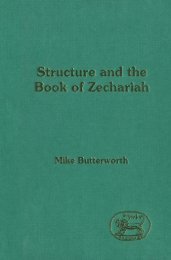Appendix CASE ONE - Collection Point® | The Total Digital Asset ...
Appendix CASE ONE - Collection Point® | The Total Digital Asset ...
Appendix CASE ONE - Collection Point® | The Total Digital Asset ...
You also want an ePaper? Increase the reach of your titles
YUMPU automatically turns print PDFs into web optimized ePapers that Google loves.
Macaulay's 'Utilitarian' Indian Penal Code 149<br />
Macaulay his first government post in June 1832 as Secretary of the Board of<br />
Control, supervisor of the East India Company's activities. 12 This, in turn,<br />
led to acquaintance with Indian affairs, with James Mill (Macaulay's sparring<br />
partner in political philosophy in the columns of the Edinburgh Review) and<br />
eventually to involvement in the drafting of the 1833 Charter Act.<br />
Not only was the offer of the position of legal member to Macaulay<br />
surprising, his acceptance might appear similarly unexpected. Six years of<br />
legislative toil in a sometimes ruinous climate and exile from the literary and<br />
political society which had recently so firmly embraced him could hardly have<br />
been a compellingly attractive prospect. However, the Indian appointment<br />
had the irresistible attraction of a huge salary of £10,000 per year. Its<br />
irresistibility lay in Macaulay's own financial insecurity and his father's<br />
impecunious state, while shifting political forces made his parliamentary<br />
post and income by no means assured. With savings from £10,000 per<br />
annum, Macaulay expected to return to England at the age of thirty-nine<br />
with £30,000, 'a larger fortune I never desired'. 13<br />
After three months of travel, Macaulay reached Madras in June 1834,<br />
later moving on to Calcutta, the seat of the Governor-General and Indian<br />
government.<br />
//. <strong>The</strong> Code's Production and Influences<br />
<strong>The</strong> 1833 Charter Act made provision for the appointment of a Law<br />
Commission whose function was to advise on and propose schemes for an<br />
eventual comprehensive and homogeneous body of legal codes for the whole<br />
of India. Within a year of Macaulay's arrival a Commission was appointed<br />
with him as its head. 14 Choice of a penal code as the Commission's first<br />
task was in large measure Macaulay's and based on several considerations.<br />
Primarily, the influx of European settlers after the 1833 Act underscored<br />
the need for a uniform penal code with jurisdiction over both Europeans<br />
and Asians. Furthermore, practically speaking, criminal law reform was<br />
politically less contentious with few vested interests at stake and fewer toes<br />
to be trodden on. As Henry Maine (a later successor of Macaulay as legal<br />
member) observed 'nobody cares about criminal law except theorists and<br />
12 Clive, ibid., 220, notes that the position paid £1,500 a year and 'carried with it the privilege of<br />
unlimited franking - one greatly appreciated by this indefatigable letter-writer'.<br />
13 Macaulay to Hannah, 17 August 1833, Trevelyan, op. cit., 289.<br />
14 Besides Macaulay the Commission members were Charles Hay Cameron, John Macleod and G. W.<br />
Anderson. Cameron was an experienced colonial legislator of strong Benthamite leanings; Macleod's<br />
usefulness was in his powers as a 'hypercritic' of what others did; Anderson was a disaster, contributing<br />
not 'even a single hint of the smallest value'. Quoted by Clive, op.cit., 439. Furthermore, in Anderson's<br />
case, Macaulay later noted that the 'greatest service [Anderson] could render to the Commission' would<br />
be to 'keep to his bed all the week round', Macaulay to T.F. Ellis, 8 March 1837 in <strong>The</strong> Letters of Thomas<br />
Babington Macaulay, T. Pinney, ed. (hereafter Letters), iii (1976), 210.






